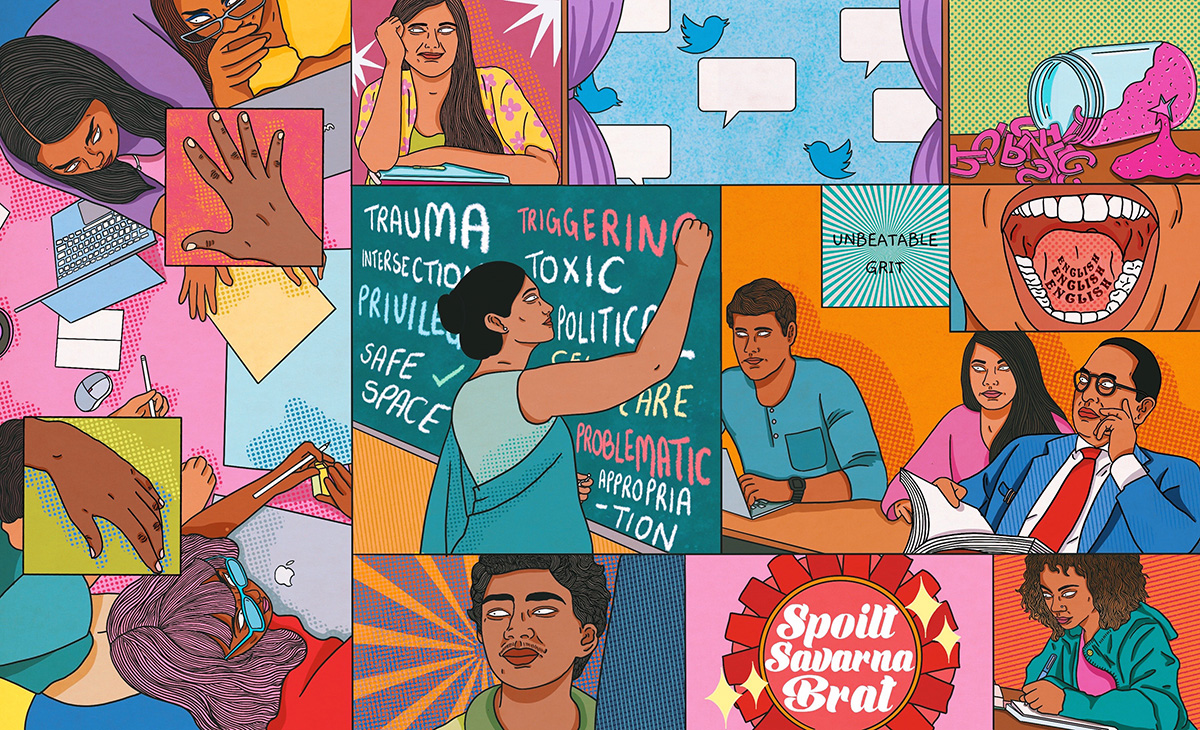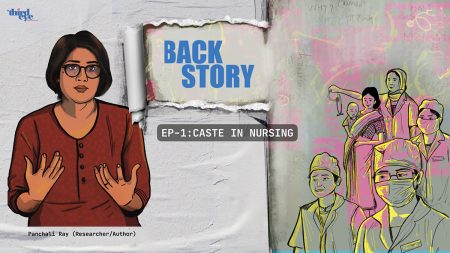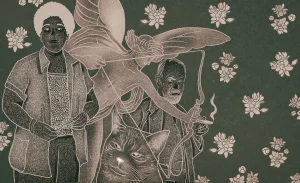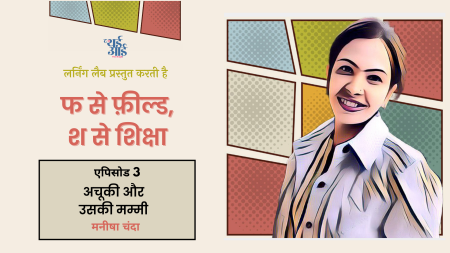I once had a student who didn’t speak much and said only what she wanted to say and even then, very little. She wasn’t shy or afraid to speak. She was just so careful with words that she refused to speak until she knew exactly what she wanted to say. During meetings, she smiled, nodded, never spoke out of turn, didn’t interrupt anybody; which is why, when she spoke, everyone shut up. Her deliberateness with language and the weight of her words—because she chose them so carefully—extended to the way she carried herself, which wasn’t with superiority but a firmness while dealing with both people and decisions.
This is a lie. This student doesn’t exist but she is very real in the stuff of my nightmares. She demonstrates everything I am not because I use too many words. Far too many. They bleed at the edges of my being and spill over even when I am not talking. I eat them for a living and spit them out for fun. It’s possible I became a teacher/writer so I could use words superfluously.
Teaching and writing are both things I enjoy very much but it’s unsettling to realise that it’s what we don’t say that matters most in both these occupations. This is discomfiting to learn in my tenth year of teaching where all I want to do is stand with a duster at the blackboard of my life (tweets included) and erase everything that I have ever said in excess.
The desire to do this intensified after my own recklessness with words was pointed out when I was in the middle of an argument with a friend, and they noted that I had no discipline with words. I was puzzled by the expression because I’d never heard the word discipline being used in such a way before. Since then, I have often revisited that phrase, gathering a little more shame each time.
I kept turning it around in my head and took it to class one day to see what the students would do with it.
We made a list of words we used unthinkingly.
A few words were allowed to pass—basically, essentially, like, maddening, amazing, etc. We’d only just begun scratching the surface. Then other words appeared—serious words that had become so much a part of our everyday that they each had the faraway, familiar echo of a bad habit being mindlessly repeated: trauma, triggering, toxic, toxic masculinity, intersectionality, political, self-care, safe space, appropriation, coming out, privilege, problematic.
We were talking about the film Arjun Reddy one day and for a while it seemed like the discussion was going somewhere because for the first 20 minutes, we permitted ourselves to continue talking about the film without using any of the words above. It made room for some questions to be asked and addressed: how many Arjun Reddys did we know in our lives? A few hands shot up. How many Preetis did we know? Many more shot up.
When I confessed that I too had once been a Preeti, many, many more hands shot up.
Then we wondered if the recognition and knowledge of how love and romance were perceived and performed in colleges across cities in the early 2000s were unacceptable to talk about today. A student said that she was more bothered by how much of her own past was visible to her in the film. That, like me, she too had once been a Preeti and had wanted the madness of Arjun Reddy, but in the current discourse, she was scared of admitting that it was something she had once desired. That there was still a part of her that desires that kind of a relationship. Was there something wrong with her?
Two other girls said yes. And added that she had the luxury of desiring because she had privilege and also that her desire was problematic. The girl backed down and didn’t know what to say after. She wasn’t English-medium educated and was able to manage only conversational English. So, when the two girls were asked to translate the words privilege and problematic into Kannada (a language all three of them knew), they hesitated.
The point here is not that the English-speaking person sometimes has warped ideas about what privilege looks and sounds like. It is not even that they may or may not think in other languages, it’s that there is a certain laziness around these words that prevents us from doing the thinking. The belief that we don’t need to know what they mean in other languages even if we speak them comes from having spent a lot of time only with people who look like us and speak like us.
Today, these words have both the lethargy and the superpower of showstoppers.
They invite applause yet remain obstacles to furthering conversation. They pretend to do the thinking on our behalf by continuing to keep us lazy.
Sometimes, I screen Nagraj Manjule’s Fandry in class to open a discussion around caste, childhood and adolescence. Fandry is the story of a young Dalit boy in love with an upper-caste girl. They study in the same class and he has to deal with his identity which is a constant obstacle in the story of his love. He dreams of her acceptance and in these dreams, he is fairer, wearing jeans and looking tall. I also use this film in class when I want to talk about love.
It is curious that the film was released in cinemas on Valentine’s Day, 2014. And when this was mentioned in class, I was asked why a film that is “so clearly about a boy who stalks a girl” is called a love story and, more importantly, what sort of a message the filmmaker intends to give youngsters by releasing a film that justifies stalking on Valentine’s Day. Also, hello, where is the trigger warning I am supposed to be issuing for girls who may have been stalked similarly?
One may consider brushing aside these objections as innocent and ill-timed and lacking in knowledge of caste. But there is a certain power drawn from the English-medium confidence of these words even when employed in the wrong context. This doesn’t help any kind of learning in the classroom. There is a comical illusion of work accomplished simply by word-dropping that steals a lot more from conversations around caste than one realises. The demand for trigger warnings for a selective set of things while exercising your right, often demanding it, to remain blissfully absent to caste regardless of how fiercely it is present—in a film, story, text, in the classroom—is appalling.
Paying attention to the words we use every day isn’t a luxury or a skill. A question that begs response at this point is whether these words exist to impact change or to make our engagement with the world lazier.
Is it contributing anything or making us shield ourselves from the actual hard work of thinking?
There is something perversely lazy about the way we have been engaging with films and books by relying on certain words to do our job. When did it become okay to say toxic masculinity 15 times in a review and believe that we have engaged with the audience and the film? Whom are we speaking to when we use these words? Why do we expect films to be better than our reviews? Is it enough to say problematic 10 times in English and not engage with a Telugu/Tamizh film?
When I wrote that last sentence, I was repulsed by the memory of all the times I’ve used the word savarna to get myself out of situations I wasn’t comfortable thinking my way out of. Even if the larger structure of the world around us is understood by caste and how much the deployment of a savarna self or savarna behaviour allows people to get away with things, I still owe it to myself to ask when and why I got so comfortable using that word on autopilot.
I teach for a living. Every time I encounter a savarna, spoilt brat student, I cannot afford to say savarna, spoilt brat student. It shouldn’t have to be that easy. It doesn’t help either of us. It does me no good as a teacher to seek comfort in knowing that I can drop the words savarna entitlement to stop an argument I don’t have the energy to sustain. I need something more logical, cold, poetic: at once slap-like, at once liberating, like the Constitution. In the writing of Annihilation of Caste, and the Constitution, Ambedkar seems to have relied on unbeatable grit. That grit is missing in the discourse. It was missing in me when someone not savarna pointed out to me on Twitter to use a strong argument to defeat the opponent instead of crying savarna savarna 500 times. I was annoyed, hurt, belittled and perhaps still not over it but I’m beginning to see why it wasn’t a nasty suggestion.
I am gambling and probably landing myself in a self-dug hole I won’t be able to climb out of as I say this but I’m suspicious of how comfortably the word ‘savarna’ rests in my mouth and the momentary relief it gives me.
When I am confronted by behaviour I can’t quite reason with in any other way, my instinct is to fall back on the word.
Why is this a problem? It isn’t a problem right away but it becomes one when I realise how using the word over and over makes me blind to myself.
American anthropologist Clifford Geertz once said, “If you want to live without violence, you have to realize that other people are as real as you are.” I think of this often, especially when I am tempted to remove the personhood of somebody I am arguing with in the classroom or on social media. Unfortunately, this makes my job hard. I have to remember that the student who asks me for trigger warning when I make the class read a Perumal Murugan short story in which a husband and wife fight over a chair—(trigger warning was asked because it was a heterosexual marriage)—is as real as I am: the teacher who wants to roll their eyes.
In The Human Stain, a 2000 novel by Philip Roth, a professor of classics is made to resign from his job following charges of racism. Coleman Silk taught a class of 14 students, and after six weeks, noticed that two students had never shown up. He asked the class if they knew who these two students were. “Do they exist or are they spooks?”
He learns later that the two absentees are both Black students. As puzzled as he is by the accusation of racism, Silk insists that he used the word spooks because he meant spooks. The fact that he hadn’t seen the students before (so “spooks” wasn’t intended to be racist) is not his defence. Silk locates his defence in an honesty he finds far more abiding than political correctness. He sticks to “I called them spooks because I meant spooks.”
“For the thousandth time: I said spooks because I meant spooks. My father was a saloon keeper, but he insisted on precision in my language, and I have kept faith with him. Words have meanings—with only a seventh-grade education, even my father knew that much. Back of the bar, he kept two things to help settle arguments among his patrons: a blackjack and a dictionary.”
If you google the word spooks today, three informal meanings appear in order (a ghost, a spy and to spook – to unnerve – and then under slang, a racial slur for a Black person.
Silk wasn’t referring to the racial slur when he said spooks. And he had no idea who the absentee students were. The conviction with which he refuses an easy defence and aims instead for one that nobody would understand (precision with words) is his tragedy but it teaches the reader a discipline with words that doesn’t seem to exist anymore.
He doesn’t let go of the argument even after multiple attempts are made to pull him down, even when he is forced to resign, and smear campaigns are led against him—costing him the loss of his wife. He refuses to part with the one secret that could perhaps set him free of the accusation—that he is a Black man himself who hid his identity long ago and swore never to reveal it.
What he seeks from the ‘spooks’ incident isn’t absolution but his dignity, which was taken away from him for exercising precision with words. His father, a stickler for words and the first Black man to live in a white colony, brought up Silk and his siblings with a discipline that Silk would find hard to leave behind despite disowning his identity and family.
Silk’s father was fussy about his children learning to speak properly. Growing up, they never said, “See the bow-wow.” They didn’t even say, “See the doggie.” They said, “See the Doberman. See the beagle. See the terrier.” They had to learn how to classify things properly and name them correctly.
They learnt the power of naming precisely very early in their lives.
That’s because Mr. Silk was teaching his children English all the time.
He did this because he knew that nobody could say or do anything to his children if they spoke the English language like they’d been born with it. His father discouraged Silk’s desire to become a boxer because he believed more in words than anything else. His way of beating people down was with words, speech, with the language of Chaucer, Shakespeare, Dickens. Not with anger.
I was in conversation with a theatre artist one day and was puzzled to hear him say that English Departments across the country had ‘appropriated’ Shakespeare, that we had no business teaching him since he belonged to theatre, not English. I had half a mind to laugh in a high-pitched voice because I could only think of Mr. Silk and how he adopted Shakespeare, made him his own, and conducted even ordinary conversations with the clarity of Mark Antony’s speech. He wielded Shakespeare like a weapon, which is what most people do. When a Black man drinks Shakespeare’s words to make himself invincible, who is to say who can lay claim on Shakespeare and who can’t? So much was his admiration for the man who taught him English that he middle-named all his children after characters from Julius Caesar.
This discipline with words, which was something Coleman Silk had known all his life, wasn’t enough to help him defend himself. (“If my intention was to say, ‘Does anybody know them, or do you not know them because they are black?’—that is what I would have said.”)
When I first read The Human Stain, I was very taken with the similarity between Mr. Silk and my father who insisted that I learn to speak and write good English so he had his children convent-educated regardless of how poor it left him.
A year ago, over a car parking tussle with a lawyer neighbour who suddenly broke into English from a string of Kannada abuses, my father had screamed, “English nimmappan mane aasthi alla,” (English is not your father’s property) which is what is said when what one actually wants to say is, “I can also talk in English.”
The English language occupies an interesting position here. There is the free-floating, showstopper way in which it is hijacked to be used today; and there is also its opposite, where one wields it like a weapon by learning it inside out, which has nothing to do with Wren, his Martin and their grammar. No one can take the English language away from you is what Silk’s father constantly told them. Something that Ambedkar too believed and showed through his work.
In the classroom today, it is tricky to remember what it’s like to develop a relationship with words, and sustain it. When we are angry, we are in danger of no longer recognising who or what exactly we are angry with. Only a relationship with ourselves, and our minds can perhaps teach us how to use words carefully. There is a real fear of how easy it’s become in the age of the internet to use words carelessly. This isn’t a diatribe against the inability to speak freely or the right to offend people. This is a recollection of what this decade has been like and whether we are now more comfortable with using words carelessly than we used to be.
The opposite of this would be to think, which I am afraid I don’t do anymore. The opposite of this is also to work hard, which, I am afraid, is also something I don’t do anymore. But this went away as quickly as it was realised. In April this year, I was at the Vaanam Art festival ranting to a friend about how annoying teaching has become today because it felt like being in a classroom with Twitter people you couldn’t even mute. I had just said this when Pa. Ranjith, who was at the inauguration, said, “Dalit people aren’t afraid of hard work, they cannot afford to be.”
I spent the rest of the day staring at my hands.





